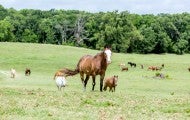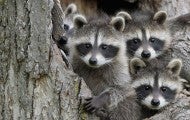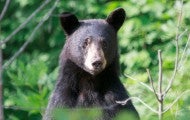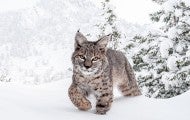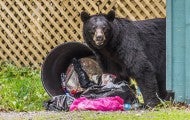In a quiet corner of Black Beauty Ranch, on a stone plinth beneath a maple tree, there’s an oval etching of a man and a burro. The man is Cleveland Amory, author and founder of the Fund for Animals, and the burro is Friendly, one of the first animals to call the sanctuary home. The two met in 1980...
As black bear numbers increase in some North American communities and more people move into bear habitat, encounters between bears and people have risen. Whether you live in bear country or are just visiting, you can take simple steps to avoid conflicts. Learn More About Bears (Please note that this...
It started in 2002: The bears around Durango, Colorado, came down from the hills to feast on the city’s garbage. Normally, natural food—nuts and berries and acorns—keeps them in the woods, but a series of droughts and late freezes in 2002, 2007, 2012 and 2017 left them hungry. Despite their fear of...
